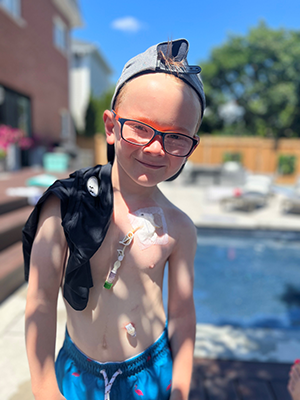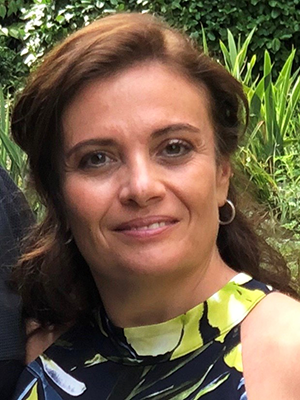Coordinated care program helps alleviate burden from families of children with medical complexities
Summary:
New research evaluates the impact of a paediatric complex care program on the outcomes of patients and families navigating the Ontario health-care system.
In 2016, Owen Rose was born pre-term at only 29 weeks old. After some time in neonatal intensive care, his parents were able to bring him home, only to experience ongoing difficulties with feeding and weight fluctuations.

For his mother Julie, Owen’s chronic medical conditions signaled the beginning of a life not just as a mother, but as a medical mother to a child with complex health needs.
“At the beginning, we had so many problems and were meeting with so many care teams,” says Julie. “It felt like we were spinning in circles trying to get Owen’s needs met while trying to balance the non-medical needs of Owen and our other children.”
Children with medical complexities like Owen have chronic health conditions which need personalized care from a variety of medical specialties, requiring families to juggle appointments, medications and correspondence with little to no previous knowledge of the health-care system.
To address this need, the Provincial Council for Maternal and Child Health (PCMCH) launched Complex Care for Kids Ontario (CCKO) in 2015 informed by the complex care model developed at The Hospital for Sick Children (SickKids). CCKO connects families to a single point of contact to help coordinate their child’s care, with the goal to improve care continuity and coordination. By doing so, the program aims to better integrate health-care delivery across health, social support and community services and reduce health-care system costs.
Now, several years after its initial launch, researchers are evaluating the impact of the program.
Provincial program narrows the burden gap in complex care
In a study published today in JAMA Pediatrics, a research team led by Dr. Eyal Cohen, Senior Scientist and Program Head of the Child Health Evaluative Sciences program, compared the key outcomes for families in CCKO to the standard care received by families of children with medical complexities.
“Our findings suggest that having a nurse practitioner act as a coordinator, navigator and single point of contact for the family may help reduce at least some of the burden associated with managing complex care needs for families,” says Cohen, who is also a Staff Physician and Co-Executive Director of the Edwin S.H. Leong Centre for Healthy Children and Senior Adjunct Scientist at the Institute for Clinical Evaluative Sciences (ICES).

For the study, 144 patients were randomized into either receiving care at one of 12 complex care clinics or waitlisted for participating in a clinic and began care one year later. Once they were part of the CCKO program, families were assigned a key worker, most commonly a nurse practitioner, to coordinate their child’s care from communication with physicians to scheduling appointments.
Families helped to co-develop the outcome measures and were assessed at the beginning of the study, with follow-up at the six-, 12- and 24-month mark. For those who had been part of CCKO for the full two years, parents reported significant improvements in physical health and that they experienced less fatigue and sleep disturbance. They also reported lower health-care costs in the second year related to hospital visits, admissions, prescription and home care.
“The improvements shown for those families who were in the program longer highlight the importance of long-term analysis of the benefits of complex care programs such as CCKO,” says Cohen.
Nurse navigators help support coordinated care for families

For those involved in the program, the delay in positive outcome measure reporting is not necessarily unexpected. Joanna Soscia is a Nurse Practitioner in the Complex Care Program and co-author on the study, and notes that families involved in the program take time to adjust to this new normal.
“Children in this program have multiple system health concerns and have a high degree of medical fragility, so many of these families struggle with fragmentation in care and poor collaboration among providers. As key workers, we help manage their child’s health and help families overcome the challenges that come from navigating the care system,” says Soscia. “Building a strong relationship with children and their families is integral to providing family-centred care and developing plans of care that are holistic and collaborative.”
This proved especially true for Owen’s parents, who became part of the SickKids Complex Care Program after a visit to the emergency department several months after his birth.
“Having a nurse practitioner coordinate Owen’s care was lifechanging,” explains Julie. “As a parent trying to navigate care for your child with complex care needs, your mental health suffers significantly and you don’t trust anybody, including yourself. Our nurse practitioner built a relationship with us and our family. Now, we feel more confident in Owen’s illness and have more time to be parents.”
Cohen adds that the research team will continue to work with PCHMH to improve the quality and implementation of this model as well as to champion the need for longer-term evaluation of the benefits of the CCKO program. They are also exploring opportunities to expand the model to help children with complex care needs transition into the adult care system.
This study was funded by ICES, the Canadian Institutes of Health Research (CIHR) and the Ontario Strategy for Patient-Oriented Research (SPOR). Other lead sites for CCKO include Children’s Hospital of Eastern Ontario (CHEO), Children’s Hospital at London Health Sciences Centre and McMaster Children’s Hospital.

